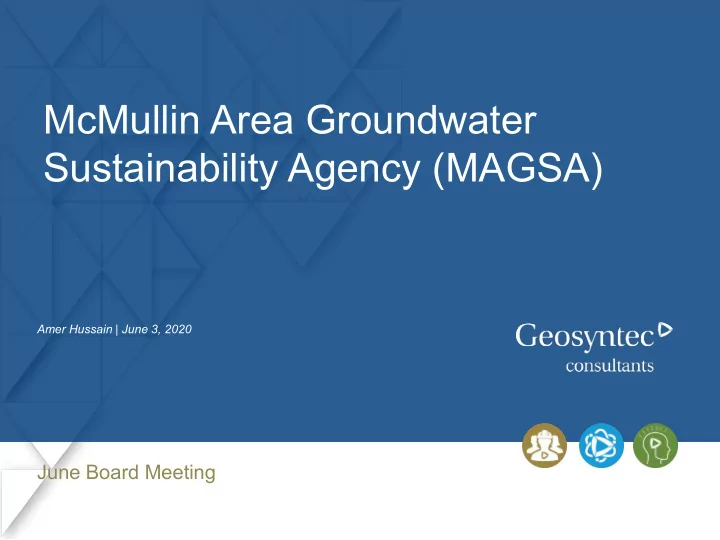

McMullin Area Groundwater Sustainability Agency (MAGSA) Amer Hussain | June 3, 2020 June Board Meeting
Outline • Introduction to Geosyntec Team • Project Scope and Overview • Communications and Outline Plan
Project Manager — Amer Hussain, PE • Principal and California registered professional engineer based in Fresno with over 25 years of experience in the southern Central Valley • Project manager for South Fork Kings GSA SGMA implementation: coordination with surrounding GSAs, negotiations to locate additional water supply, improvements to conveyance structures, and deep groundwater recharge through ASR wells • Also working with private landowners on SGMA response
Scoping and Strategy Lead — Bob Anderson • Senior principal and hydrogeologist with over 30 years of experience in groundwater resource planning. • Leads Geosyntec’s SGMA initiative including Borrego, Salinas, Santa Ynez Basins, • Lead technical advisor to the South Fork Kings GSA on Tulare Lake GSP. • Prior experience in the Columbia River Basin conducting similar watershed scale groundwater planning and agricultural water management assessments.
Water Resources Engineer — Kristin Reardon, PhD, PE • Water resources engineer with more than 20 years of experience, specializing in studies to support decision-making for water resource managers and communicating complex technical issues to diverse audiences • As a lead author of the Central Valley Flood Protection Plan 2017 Update, Kristin focused on flood policy issues • Kristin has worked with irrigation districts in the San Joaquin Valley, the California Department of Water Resources, and the US Bureau of Reclamation
Outreach Task Lead — Dave Ceppos Facilitation — Malka Kopell • Dave Ceppos is a managing senior mediator and manager of Sacramento State’s Consensus and Collaboration Program (CCP) and oversees CCP’s extensive portfolio of water policy and stakeholder outreach efforts, including work with 35 different GSAs. Dave currently acts as facilitator of record for the Chowchilla GSA and is also working in the Madera, and Kaweah subbasins. • Malka has over 30 years of experience collaborating with communities throughout California and nationally with meeting facilitation, conflict resolution, and process design. Malka is the lead facilitator and public engagement advisor for the Madera GSA and is also working with the adjacent Chowchilla GSA.
Surface Water Rights and Legal Support — Gwyn-Mohr Tully and Greg Young, PE (Tully and Young) • Licensed attorney in California with extensive experience in surface and subsurface hydrology, law and policy. He has evaluated water rights, contractual water obligations, negotiated water transfers, and water settlements throughout CA. • Gwyn wrote an Amicus Brief to the California Supreme Court in Barstow v. Mojave on the fundamental underpinnings of CA water rights law. • Registered civil engineer with over 30 years experience in water resource management. Greg provides expertise to local agricultural and urban water purveyors, public agencies, non-profits and private interests on SGMA compliance, water asset management and water rights reporting. • Currently, Greg is the lead technical strategist for SGMA efforts in Madera County and Merced County.
Water Transfer Economics — Steve Hatchett Regional Economics — Duncan MacEwan • Senior economist and project manager with over 30 years of experience specializing in water resources, agriculture, mathematical modeling, statistical analysis, benefit-cost analysis, cost allocation, CEQA/NEPA support, and regional economic impacts • Principal economist and managing partner of ERA Economics; specializes in the economics of water resources and agriculture. • Lead economist on several GSPs in high and medium priority groundwater sub-basins • Works with clients to assess the value of water assets, evaluating third party impacts of water transfers, and evaluating the impacts of alternative demand management strategies.
Project Overview What we are doing What we are NOT doing • Describing components of a • Formalizing a groundwater groundwater market allocation • Preparing a range of alternatives, requirements and • Initiating a water market options for a MAGSA groundwater market • Conducting water transactions • Evaluating constraints and opportunities for surface water • Negotiating water agreements usage in MAGSA • Listening to stakeholder outreach on preferences and concerns
What are the components of a market? Allocations Basin Conditions Trading Structure Market Rules •Sustainability •The marketplace •Participation •Identify and assign indicators where buyers and ownership to •Trading limits, carry- sellers exchange different sources of •Technical, over groundwater credits groundwater stakeholder, and •Prevent/mitigate political •Includes any water unintended outcomes considerations imports and projects Monitoring & Market Administration Market Reporting Enforcement •Method for tracking •Entity that oversees •Transaction groundwater use, the groundwater documentation trades, and enforcing market •Price discovery allocations •Development costs, •Confidentiality operating costs, and funding sources
Communications and Outline Plan • Four main elements: – Initial Inquiry – Technical Workshops – Public Communications – Focused Stakeholder Engagement
Initial Inquiry • Purpose: to assess and confirm potential information needs and stakeholder concerns • Informal stakeholder interviews • Stakeholder survey • Standing GSA meetings • Timing: April-July 2020
Technical Workshops • Purpose: to provide select opportunities during project development to engage with stakeholders in a group to provide information and get feedback • Content: overview of a water market strategy, relationship to various GSP projects, alternative approaches to combining surface water and groundwater marketing, updates on surface water projects, etc. • Timing: 3 Workshops -currently planned for July 2020, October/November 2020, March/April 2021
Public Communication • Purpose: get the word out broadly and provide additional feedback opportunities • Utilizing and coordinating the communication methods currently used by MAGSA (website, listserv, MAGSA Board meetings, Stakeholder Committee meetings, etc.) • Timing: throughout
Focused Stakeholder Engagement • Purpose: to better understand stakeholder concerns and to more fully engage beyond technical workshops, MAGSA board meetings, etc. • Smaller interviews conducted by third-party neutral consultants • Timing: throughout
Next Meeting TECHNICAL WORKSHOP ADDITIONAL INFORMATION COMPARISON OF VARIOUS SCHEDULED IN JULY ON ALLOCATIONS EXISTING MARKETS
Questions 17
Recommend
More recommend